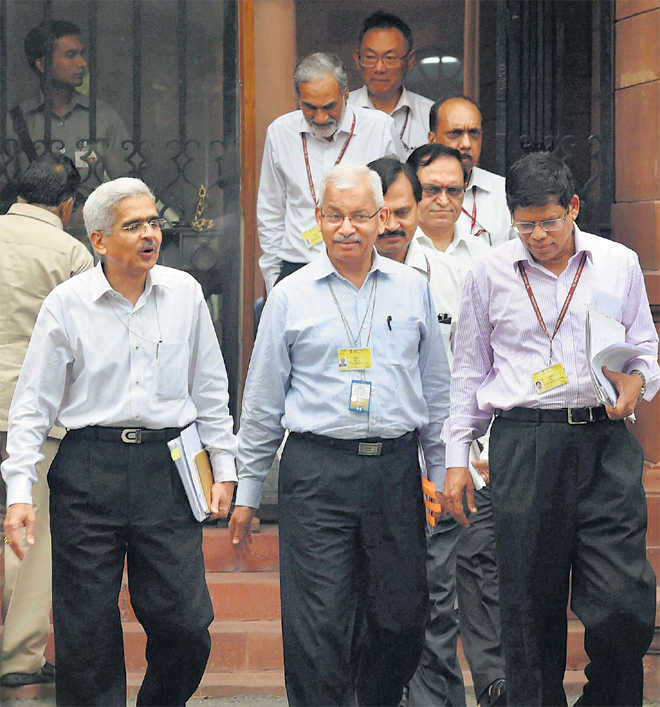Live up to mandate of the Constitution
MG Devasahayam
Former Army and IAS officer
Nineteen forty eight being its first batch, the Indian Administrative Service (IAS), the nation’s prime instrument of governance, completes 70 years of its existence. A successor to the Indian Civil Service of the colonial era, IAS came with a different philosophy and a distinct agenda moored on the ‘Idea of India’ propounded by the founding fathers for a nation and its people ‘freed from the fetters of the past’.
The ‘political idea’ was for India’s democracy to rise, storey by storey from the foundation, consisting of self-governing, self-sufficient, agro-industrial, urbo-rural local communities — gram sabha, panchayat samiti and zila parishad — that would form the base of Vidhan Sabhas and the Lok Sabha. These politico-economic institutions were to control and regulate the use of natural resources for the good of the community and the nation.
Built on this foundation, the ‘economic idea’ of development envisages independent India as sui generis, a society unlike any other, in a class of its own that would not follow the western pattern of mega industrialisation, urbanisation and individuation. India’s would be agro-based, people’s economy that would chart out a distinct course in economic growth, which would be need-based, human-scale and balanced while conserving nature and livelihood. Such a ‘development’ process would be democratic and decentralised.
It is from this ‘Idea of India’ that the governance framework for the nation emerged with the IAS as its bulwark. Adhering to and advancing the ‘Idea of India’, therefore, is the raison d'être of the IAS, covenanted in the Constitution, and given constitutional protection, a rarity among nations. With such kind of prestige and protection, the IAS was to be the bastion against "convulsive politics" and "self-seeking politicians" and its mandate was to "give a fair and just administration to the country and manage it on an even keel".
Unfortunately, as the years advanced post-independence, political masters, administrators and advisors lost sight of the ‘Idea of India’. To begin with, the Constitution itself did not provide for the grassroots panchayat raj institutions on which the democratic edifice was to be built upon. On the ‘development’ side, what emerged was a chaotic command-and-control ‘mixed-economy’. Administratively, the paradigm shift from a colonial-hierarchical system to democratic-participatory framework did not take place. In the event, the country in general and rural India in particular has been in the doldrums, politically, economically and administratively.
This was the situation that prompted the former President KR Narayanan to say these words of anguish just before he passed away in 2005: “Decades into the free life of our nation, we find that justice --- social, economic and political --- remains an unrealized dream for millions of our fellow citizens. The benefits of our economic growth are yet to reach them. We have one of the world’s largest reservoirs of technical personnel, but also the world’s largest number of illiterates, the world’s largest middle class, but also the largest number of people below the poverty line, and the largest number of children suffering from malnutrition. Tragically, the growth in our economy has not been uniform. Many a social upheaval can be traced to the neglect of the lowest of society, whose discontent moves towards the path of violence”.
The Constituent Assembly had resolved to establish the IAS for “attracting to the highest service the best material available in the country transgressing political boundaries.”According to public perception that came out of two surveys held in 2010, this “highest service” is now sub-serving lowest political interests rather than serving the public. Survey results clearly indicated appalling corruption and compromise leading to administrative collapse. This is just the opposite of what the founding fathers had envisaged.
Self-destruction of the IAS started during the Emergency when the bulk of civil servants chose to crawl when asked to bend by the minions who desecrated the Constitution and democratic governance enshrined therein. On the morning after the nocturnal declaration of Emergency on the night of 25/26 June, 1975, IAS bureaucrats of the Union Home Ministry ran like headless chicken issuing panic-ridden directions and drafting draconian laws/rules to bring India under autocracy instead of questioning the sudden death of democracy and the destructive role played by an extra-constitutional power centre. No wonder, this cowardice trickled downwards!
Since then, it has been a downslide with most senior IAS officers pandering to every wish of the political masters. I have known chief secretaries and principal secretaries in states seeking the ‘mind of the chief minister’ on decisions to be made before writing their notes. Appointments depended on this ‘capacity’and not performance, merit or independent thinking. This disease now pervades the Centre also.
Liberalisation, globalisation and privatisation in the 90s brought in further slide in the IAS. Predatory, crony-capitalist, nature-killing, land-grabbing and money-guzzling ‘development model’ has become the mission and mantra for IAS mandarins at every level. The enthusiasm with which some district collectors in Tamil Nadu pursue such projects and the support they receive from seniors is to be seen to be believed. Conflict between such predatory development agenda and basic governance has led to a rot.
Essential features of basic governance are maintenance of communal harmony and law & order; rendering of timely justice; efficient and corruption-free delivery of services; protection of environment and natural resources and paving the way for decentralised and distributed development that could be equitable and inclusive. Governance at cutting-edge and policy levels should be oriented towards the ‘bent, dried up stick of a man’ who represent the poor India. It is for this purpose that the mandarins are vested with such authority and not to pander to the money-bags and corrupt politicians. On these counts, there have been excellent individual achievements. But as a service, the IAS has not lived up to the mandate of the constitution and fallen prey to "convulsive politics" and "self-seeking interests". This is the reality that needs to be remedied, and the sooner, the better.










